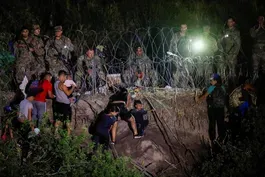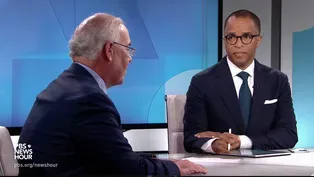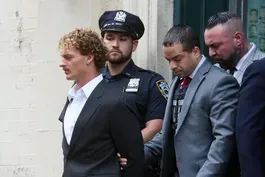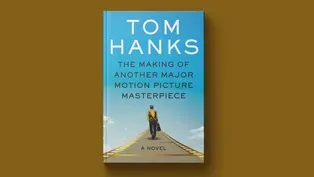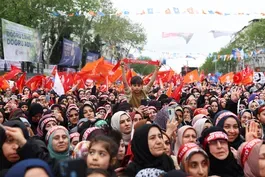
Public health questions remain as COVID emergency ends
Clip: 5/12/2023 | 8m 50sVideo has Closed Captions
Public health questions remain as COVID emergency ends
After more than three years, the COVID-19 public health emergency has ended. Thanks to vaccines, testing and treatment, we are in a much better place and deaths are at their lowest level since March 2020. But concerns over how the federal government will respond to new variants or even a serious new epidemic remain. William Brangham discussed that with Dr. Jennifer Nuzzo.
Problems with Closed Captions? Closed Captioning Feedback
Problems with Closed Captions? Closed Captioning Feedback
Major corporate funding for the PBS News Hour is provided by BDO, BNSF, Consumer Cellular, American Cruise Lines, and Raymond James. Funding for the PBS NewsHour Weekend is provided by...

Public health questions remain as COVID emergency ends
Clip: 5/12/2023 | 8m 50sVideo has Closed Captions
After more than three years, the COVID-19 public health emergency has ended. Thanks to vaccines, testing and treatment, we are in a much better place and deaths are at their lowest level since March 2020. But concerns over how the federal government will respond to new variants or even a serious new epidemic remain. William Brangham discussed that with Dr. Jennifer Nuzzo.
Problems with Closed Captions? Closed Captioning Feedback
How to Watch PBS News Hour
PBS News Hour is available to stream on pbs.org and the free PBS App, available on iPhone, Apple TV, Android TV, Android smartphones, Amazon Fire TV, Amazon Fire Tablet, Roku, Samsung Smart TV, and Vizio.
Providing Support for PBS.org
Learn Moreabout PBS online sponsorshipGEOFF BENNETT: After more than three years, the COVID-19 public health emergency has ended.
Thanks to vaccines, testing and treatment, we are in a much better place and deaths are at their lowest level since March 2020.
But concerns over how the federal government will respond to new variants or even a serious new epidemic remain.
William Brangham has our look.
WILLIAM BRANGHAM: More than 1.1 million Americans have died of COVID since the pandemic began three years ago.
For those who lost loved ones early on, this moment, where the country has declared an end of the public health emergency, is a complicated time.
TRACEY THROWER, Widow of COVID Victim: My name is Tracey Thrower.
I am the wife and widow of John Thrower Jr. My husband passed away from COVID September the 23rd, 2020.
He died of something that he should not have died of.
And I know people think it is over with, but it is not.
Going out there in the public and being out there, it has scared me so much, because what he went through, I wasn't -- I was not there when he passed away.
I couldn't be there.
That was the beginning of the pandemic.
I could not touch him.
I could not say goodbye.
I am still dealing with it.
There's no time frame on death for someone you love.
There's no time frame.
I live with this every day.
I had to go to therapy because of the death of my husband.
So I live with this every day.
So, they don't get it.
Some people that don't -- have not lost a loved one, some people that it has not affected them, they go home with their everyday life, because they think they're invincible.
But they're not.
It can happen to any of us.
MAX OSCEOLA III, Son of COVID Victim: Hello.
My name is Max Osceola II.
My father is Max Osceola Jr.
I'm a member of the Seminole Tribe of Florida.
My father, he himself was a member of the Seminole Tribe of Florida.
He was a councilman in my tribe for 26 years.
He served 13 two-year terms.
And he accomplished a lot for us.
My father passed away in -- roughly about two years ago.
It was October.
It was in the very beginning of COVID.
My mother was with my father for 50 years.
They were high school sweethearts.
Their life was intertwined in a way that is unimaginable.
So that's really what it is.
It's about understanding life and moving forward in the sense of, how can we honor my father?
I think society has already opened up, in a sense, and our governments are just reacting to that, where we're better prepared for the other emergencies.
COVID is not going away.
The genie is out of the bottle.
So I'm sure, in the future, there's going to be another outbreak.
Hopefully, we respond accordingly.
My family has been able to honor my father.
We have been able to have a little bit more closure.
We're very, very fortunate for the father that we have.
There was a lifetime of love.
WILLIAM BRANGHAM: Many of the federal programs set up in response to the pandemic are now also ending with the expiration of the emergency order.
So, where does that leave us?
For a closer look at that, we are joined again by Dr. Jennifer Nuzzo, professor of epidemiology and director of the Pandemic Center at Brown University School of Public Health.
Dr. Nuzzo, great to have you back on the "NewsHour."
I mean, we had been talking on and off for three years of this pandemic, and through some of the worst periods of time, and now as the light that seems to be at the end of this tunnel.
Where do you see this moment that we are in right now?
DR. JENNIFER NUZZO, Brown University School of Public Health: Well, I think it is where you said it is, a complicated time.
I mean, we are in a complicated time.
COVID, the acute emergency is over.
The emergency declaration is over.
But the tolls of COVID, including the loss of life, persist and continue.
And, in my view, those tolls remain unacceptably high and really point to the need for continuing to work to reduce those tolls and also, crucially, to make sure we are never again left as vulnerable to a virus as this one made us.
WILLIAM BRANGHAM: To that point, though, this virus is still with us.
Do you think we are -- have the right eyes on this situation right now?
Are we doing enough monitoring so that, if a new variant emerges, if cases were to tick up again, we'd be able to see it in time?
DR. JENNIFER NUZZO: Yes, I'm quite worried about our abilities to pick up future emergencies.
That may include a future COVID variant, but it probably also includes other viruses that we have yet to discover that could emerge and cause pandemic threats.
But much of that progress is at risk now with the end of the emergency.
We are scaling back the types of data that we are collecting.
And that generally gives us less insights into what's going on with COVID.
But it also means that we will have less ability to pick up new pandemic threats.
And so the point that I really want to make clear is that, while the acute COVID emergency has ended, our vulnerability to events like COVID has not changed, unless we decide to take action to make it change.
That requires improving our data, along with a lot of other things that we still have yet to do.
WILLIAM BRANGHAM: As you well know, there is this ongoing fight in Congress over some of the things that you're describing here.
What do you think are the key priorities that we ought to be focused on, even as we -- quote, unquote -- "wind down" this end of the pandemic?
DR. JENNIFER NUZZO: So, first of all, the fact that we are having fights over pandemic preparedness at this point, after witnessing the loss of a million Americans, is, to me, unfathomable.
I just don't know how much more we need to endure in order to make the investment in preparedness worth it.
But in terms of what we should be doing with the resources that we have is, first of all, we have to be fixing our data.
For most of the pandemic, we were just trying to triangulate our way to the truth.
We had huge blind spots in understanding what was happening with COVID, who was being affected worse by it, what sorts of activities and places were driving transmission, and how COVID was affecting us.
We didn't have a complete picture in all communities.
That was one big problem.
But, also, we're not done in terms of treating COVID and also thinking about how to make ourselves less vulnerable to severe illness from other respiratory threats.
So, one thing I really liked to see are new vaccines that produce longer-lasting immunity and possibly prevent infection.
That would be great.
Not sure if that's scientifically possible, but absolutely worth the investment in the science.
Making sure that we have the best possible treatments that we can, not just for COVID, but thinking about future infections.
And then also, crucially, we need to figure out what sorts of other measures we want to put into place in our communities to reduce our vulnerability not just to this virus and other viruses that we know continue to threaten us year in and year out, like influenza and RSV.
We had big problems with that in the fall, but thinking ahead to future threats.
It is possible to make investments now to put into place a bolstered infrastructure and plans that can be ready to snap into place such that, when the next pandemic threat arises, we don't have to have our lives upended in the way that COVID did.
We have seen progress being made in terms of tackling other public health threats.
I like to think of public health threats like the way we think about other recurring hazards like fires.
If we reduce our social vulnerabilities, we reduce our community-wide vulnerabilities to these threats, we can go about our lives largely not thinking about them, but with enhanced safety against them.
WILLIAM BRANGHAM: On the issue of long COVID, we know there are still millions of people suffering with that.
And, on some level, the end of the emergency declaration doesn't mean much to them, because they are still and continue to suffer.
Do you think we are doing enough research to understand what is happening with that ailment and how to help those people?
DR. JENNIFER NUZZO: This is something that I think we have not done right by these patients.
These patients are suffering quite a bit.
And they haven't gotten the kind of resources they need to help them.
And I want to stress that this is likely not just about COVID.
It is possible that what we are seeing in patients who are affected by COVID could be something that we could experience with other infectious diseases.
So, while the case numbers of COVID may be diminishing, the need to understand how viruses can affect us in the long term has not changed.
And it's an important point that we should be investigating, so that we don't yet have long X, Y, and Z when we think of other viruses that we may encounter or experience large outbreaks of.
WILLIAM BRANGHAM: All right, Dr. Jennifer Nuzzo, the Brown University School of Public Health, always good to see you.
Thank you.
DR. JENNIFER NUZZO: Thanks for having me.
Border stays calm but new asylum policies lead to confusion
Video has Closed Captions
Clip: 5/12/2023 | 6m 27s | Southern border stays calm but confusion builds as new asylum policies take effect (6m 27s)
Brooks and Capehart on border policy, debt ceiling debate
Video has Closed Captions
Clip: 5/12/2023 | 10m 24s | Brooks and Capehart on U.S. border policy and debt ceiling negotiations (10m 24s)
Man who put Jordan Neely in fatal chokehold released on bond
Video has Closed Captions
Clip: 5/12/2023 | 7m 48s | Man who put Jordan Neely in fatal chokehold released on bond after manslaughter arrest (7m 48s)
Tom Hanks discusses his debut novel
Video has Closed Captions
Clip: 5/12/2023 | 7m 55s | Tom Hanks on his debut novel, 'The Making of Another Major Motion Picture Masterpiece' (7m 55s)
Turkey prepares for election as Erdogan tries to hold power
Video has Closed Captions
Clip: 5/12/2023 | 6m 2s | Turkey prepares for consequential election as Erdogan struggles to maintain power (6m 2s)
Providing Support for PBS.org
Learn Moreabout PBS online sponsorshipSupport for PBS provided by:
Major corporate funding for the PBS News Hour is provided by BDO, BNSF, Consumer Cellular, American Cruise Lines, and Raymond James. Funding for the PBS NewsHour Weekend is provided by...
